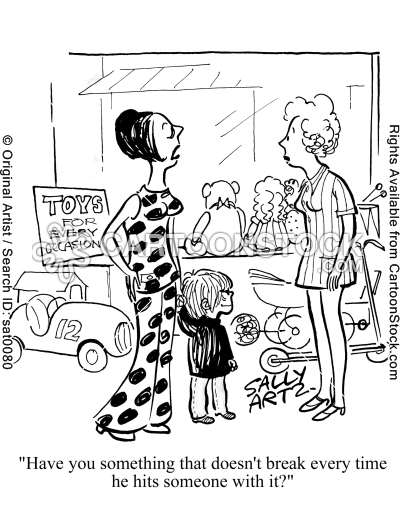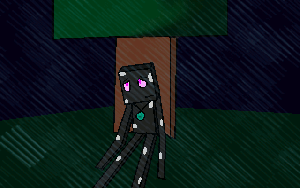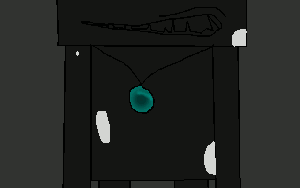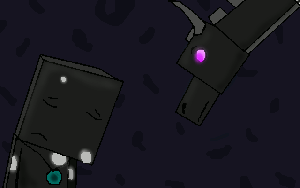Last week Mr. Boo had a rough transition while getting ready to go out with his behavioural interventionist. I’ve gotten pretty good at dealing with these situations, but I still get caught off-guard sometimes. This time it resulted it me getting punched in the jaw. It has been a long time since Mr. Boo hurt me, partly because it happens less frequently than when he was younger, and partly because I’ve gotten pretty good at staying just out of range when I see that he might lash out. I was very upset by what happened. Not only did it hurt, but I worry about his future. It’s one thing to be a little kid who hits when he’s angry or frustrated, but the picture is going to look a whole lot different when he’s a teenager or an adult. While I know he’s improved immensely over the years, the potential is still there and it worries me.
I wondered if maybe I should be doing something…something more, or something different. I began to mull it over in my head and over the course of the next few days I noted two other behaviours that, while not as bad as hitting, are still things I’d like to address with a more concrete plan than just reminding him such behaviours are unacceptable. First, when he’s angry or frustrated he sometimes throws things. He’ll basically grab the nearest thing and hurl it in no particular direction. Countless things have been broken, but of course there is also the potential for damage to other people who happen to be in the line of fire. Again, this is an issue that has improved over the years, but still presents itself on occasion.
Second, there is the swearing. This started in earnest about a year ago and, while we all drop the occasional f-bomb in our family, there are times when he really crosses the line.
I began to think that perhaps I was going to have to introduce some form of punishment in an attempt to influence his behaviour. When he is raging, in the heat of the moment, all he can think about is himself. While later he will feel remorse for what he has done, it isn’t powerful enough in the moment to stop him. I began to wonder if maybe a specific punishment would serve as a stronger motivator. I’ve always believed that punishment is ineffective at best, and counterproductive and damaging at worst. But maybe, I thought, I needed to reconsider. Autism has caused me to rethink other aspects of my parenting, so why not this one?
In this case, the punishment that would have the most impact would be one that affects what he loves most: his laptop. But if I was going to implement a punishment system then I would have to be very clear to state the rules up front. Autistic kids respond well to rules that are clearly laid out ahead of time, but they also have a keen sense of fairness: you can’t just make sh*t up on the fly.
Well, I soon ran into some problems. How long would he be removed from his laptop? What if he picked up an iPad instead, or went on the PlayStation? Would watching YouTube count? Would I have to remove access to all screens? Would the extent and duration of the punishment be adjusted to “fit the crime”? And how would I go about doing that when there are no set screen times in our family?
It got worse as I considered more scenarios. What if, as in last week, he hit me as he was heading out for the afternoon? Is he going to spend 3 hours with his interventionist and then come home and not be allowed on his laptop? That is way too much time between the crime and the punishment to be in any way fair or to have any meaning for him. He may have had an excellent session, and he’s going to come home to being punished?
And what if he needed a sensory break? Immersing himself in the digital world is his go-to solution when his sensory inputs get overwhelmed. We’ve always encouraged this form of self-regulation. Using it as a punishment sends the wrong message.
Frankly, the whole thing was bothering me. I just couldn’t come up with a set of punishments that made sense, were fair, and were easy to implement. I couldn’t even figure out what it would look like for myself, let alone explain it to him. But if not that, what could I do to curb these problem behaviours?
Well, I’m happy to say that the solution presented itself today. Mr Boo had a mini-meltdown when, after finishing his homeschool work, he learned that his sister was using the big screen and he could not play on the PlayStation. By his logic, since he had interrupted his game to do homeschool work, he expected to go back on when he was done. But his sister was now using it. When I said he’d have to wait, he lost it. He went into the bedroom and, before I could go in there to help him calm down, he picked up a timer and threw it across the room, breaking it. I was angry and immediately announced that he was no longer going to get his turn on the PlayStation when his sister was done (and still, in my head, I’m thinking “is this for all day? if not then for how long? what would be a fair delay given that he is going out this afternoon?”). Well this only served to make him more angry and he tried to throw a lamp, but by then I was close enough to block him.
He calmed down fairly quickly after that (we’ve got a system that works well for us now), and began to tell me that this punishment thing was not a good idea. Inspired by the program director at the wonderful Centre he attends each week, I decided to listen to what he had to say and involve him in the discussion (she once spent a good hour doing just that with him, and managed to work a minor miracle – more in a later post perhaps). He told me that my job was to help him calm down (its a set of skills we work on together), and by telling him his punishment I was actually making it worse for him. I understood: he has told me he doesn’t like raging, that it is scary for him, and he is very grateful that I am there to help him find his way down to calmness. So if he sees me as the person – the rock – to which he can cling when raging, then how must it feel to have me making it worse by giving him even more to be angry and anxious about?
My first thought upon recognizing this was that maybe I should wait until after he calms down to tell him of his punishment , but right away that didn’t make sense either. Reward him for doing good emotional work by telling him of his fate? Naw. So instead I asked him what HE thought we should do about these behaviours. He wasn’t sure at first, but then I remembered something I read on the Aha Parenting website. Dr. Markham has written some excellent articles explaining why punishment doesn’t work, and I love the alternatives she suggests. In this article she describes empowering your kids to repair the damage they have done. Whether this is the hurt feelings of a playmate, the broken window of a neighbour, or admitting to stealing a toy, what kids really need to learn is how to make up for their mistakes, to really experience the impact of their actions, and to take ownership and responsibility for their actions. Importantly, they need to see you as someone who can help them do the right thing when they screw up, not the person who just makes them feel worse. So I decided to try her approach with Mr. Boo.
The issue was that he threw my timer (which he apologized for) and may have broken it. Together we came up with two solutions: if the timer was not broken he could make it up to me by helping with some household chore I needed to do. If it was broken, he offered to use his allowance to buy me a new one. What I loved about the process of discussing this with him was how strong our connection was during this time. I had helped him calm down and, as we usually do, I was holding him in my lap and rocking him forward and back (the rocking motion really soothes him). He was hugging and kissing me, his way of letting me know he felt bad for how he had acted. And all the while we talked about how to make up for his actions. He was not happy about having to do a chore or spend his allowance money, but he was a willing participant in this being a solution and the entire atmosphere around the discussion was one of working together and maintaining the integrity of our relationship. There was no argument about whether he should do anything to make up for it: he clearly wanted to. This is so different from the attitude of being punished, where all the focus is on being a victim, with little room for remorse.
For my kids, perhaps more than neurotypical kids, I am their rock. The world can be a scary, intimidating, and frightening place for them and they count on me to protect them, guide them, and help them deal with overwhelming emotions. Punishment changes my role entirely to one of combatant, a player on the other team, which erodes their trust in me. It also puts them on the defensive, sends their anxiety through the roof (with autistic kids, its all about reducing anxiety), and puts them in a worse place rather than a better one.
While part of me can’t believe I even considered using punishment, I’m glad I went through this thought experiment. It has reinforced to me, more than ever, that my instincts were right and that such an approach would do far more damage to my kids than it would help. I’m happy that together Mr Boo and I came up with a solution, that he was involved in the discussion, that it was done in a loving and warm atmosphere of connection, and that he took ownership of his actions and admitted that he was wrong. From now on, when he swears at us, throws something, or hurts somebody we will decide together what he can do to make up for it. It won’t always be fun for him, but we’ll still be on the same team.








